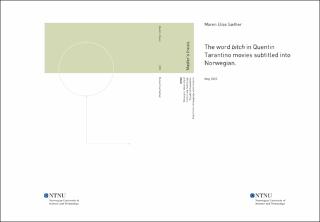| dc.contributor.advisor | Greenall, Annjo Klungervik | |
| dc.contributor.author | Sæther, Maren Elise | |
| dc.date.accessioned | 2022-07-15T17:19:30Z | |
| dc.date.available | 2022-07-15T17:19:30Z | |
| dc.date.issued | 2022 | |
| dc.identifier | no.ntnu:inspera:109722273:25419426 | |
| dc.identifier.uri | https://hdl.handle.net/11250/3005889 | |
| dc.description.abstract | Denne masteroppgaven har undersøkt den norske oversettelsen av ordet bitch i ni filmer regissert av Quentin Tarantino. Prosjektet søkte etter å finne ut hva som skjer med banneordet “bitch” i de norske undertekstene i filmene av Tarantino, om det er en forskjell mellom oversettelsen av ordet i de gamle versus de nye filmene, og om det er forskjeller i oversettelsen når det gjelder hvilket kjønn ordet er rettet mot. Hypotesene var at graden av profanitet som kommer av ordet bitch vil bli redusert i den audiovisuelle oversettelsen. Den andre hypotesen var at bitch ville ble mer redusert i de nyere undertekstene enn de glamle, på grunn av samfunnsutviklingen som har ført til en økt bevissthet rundt likestilling, hvilket påvirker oversettelsen. Den tredje hypotesen var at banneordet ville ble mer redusert I grad av profanitet når det ble rettet mot en kvinne enn en mann, på grunn av oversetterens ideologi og bevissthet rundt kvinnediskriminering og dermed den negative effekten bitch kan ha når det rettes mot en kvinne. Tarantinos filmer ble valgt på grunn av det høye antallet banneord. Den muntlige dialogen og undertekstene ble sammenliknet med fokus på bitch, og deretter analysert i tråd med prinsippene om «descriptive-explanatory analysis» (Saldanha & O’Brian, 2013, p. 50). Oversettelsene av ordet ble analysert ved å se på hvilke oversettelsesstrategier som ble brukt, for å kaste lys på om og i hvilken grad bitch ble redusert. Funnene viste at termen bitch ble redusert i grad av profanitet i de norske undertekstene, da bare 50,6% av tilfellene ble oversatt ved bruk av en strategi som bevarte profaniteten. Dette bekrefter den første hypotesen. Dette kan forklares med de ulike begrensningene som følger av audiovisuell oversettelse, men også på grunn av ideologi og som et forsøk på å tilpasse teksten til det norsktalende publikumet. Resultatene viste imidlertid ingen klar tendens på at bitch ble mer eller mindre redusert i de nyere undertekstene enn de gamle, hvilket avkrefter den andre hypotesen. Til slutt, viste resultatet at graden av profanitet ble bevart i 88,9% av de faste uttrykkene som inkluderte bitch, som var alle rettet mot menn. Til sammenlikning, ble profaniteten bevart i kun 34,6% og 60% av tilfellene når bitch sto alene eller i en kollokasjon. Dette indikerer at graden av profanitet er mer redusert når ordet eller frasen det er inkludert i er rettet mot en kvinnelig karakter enn en mannlig, hvilket bekrefter den tredje hypotesen. Dette kan forklares av oversetterens ideologiske ståsted, samt den økende bevisstheten rundt kjønnsproblematikk, og at ordet derfor kan ble ansett som mer politisk ukorrekt eller fornærmende når det er rettet mot en kvinne enn en mann. | |
| dc.description.abstract | This master’s thesis has investigated the Norwegian subtitle translation of the word bitch in nine movies directed by Quentin Tarantino. The project sought to find out what happens to the swear word “bitch” in the Norwegian subtitle translation of the films directed by Quentin Tarantino, whether there is a difference between the word’s translation in the older and newer films, and differences regarding the gender of the target of the insult in various cases. The hypotheses were that the degree of profanity caused by the use of the word bitch is reduced in the audiovisual translation. Secondly, it was hypothesized that bitch will be more reduced in the newer subtitles than in the older, because of the change in the society regarding the increasing awareness of equality issues. Thirdly, a hypothesis is that the degree of profanity will be more reduced when the term is directed at female characters than towards male characters, because of the translator’s consciousness of female discrimination and thereby the plausibly hurtful effect bitch can have when directed at women. Tarantino’s movies were chosen because they contain a significant number of swear words. The source text and target text were compared with a focus on the word bitch and thereafter analyzed with a descriptive-explanatory approach. The translations of the word were analyzed by considering which strategies were employed in translation, in order to shed light on whether and to what extent the degree of profanity was conserved. The findings showed that the term bitch was reduced in degree of profanity in the Norwegian subtitles, as only 50,6% of the instances were translated with the strategy translation with strong force, confirming the first hypothesis. This could be explained by the constraints of audiovisual translation, such as the time and space constraints, but also due to ideology and as an attempt of altering the text to fit the target text audience. The results did not show any clear tendency concerning the relationship between profanity that is caused by the use of bitch and the release time of the movies, which disconfirms the second hypothesis. Lastly, the findings of the study showed that 88,9% of the fixed expressions containing the word bitch, which were all directed at males, were translated using translation with strong force. In comparison, 34,6% and 60% of the single items and collocations were translated with strong force. This indicates that the degree of profanity is more reduced when it is targeted towards a female than a male, validating the third hypothesis. This could be explained by the ideological stance of the translator and the increasing gender consciousness, as the word could be perceived as more politically incorrect or insulting when directed at a woman than a man. | |
| dc.language | eng | |
| dc.publisher | NTNU | |
| dc.title | The word bitch in Quentin Tarantino movies subtitled into Norwegian. | |
| dc.type | Master thesis | |
